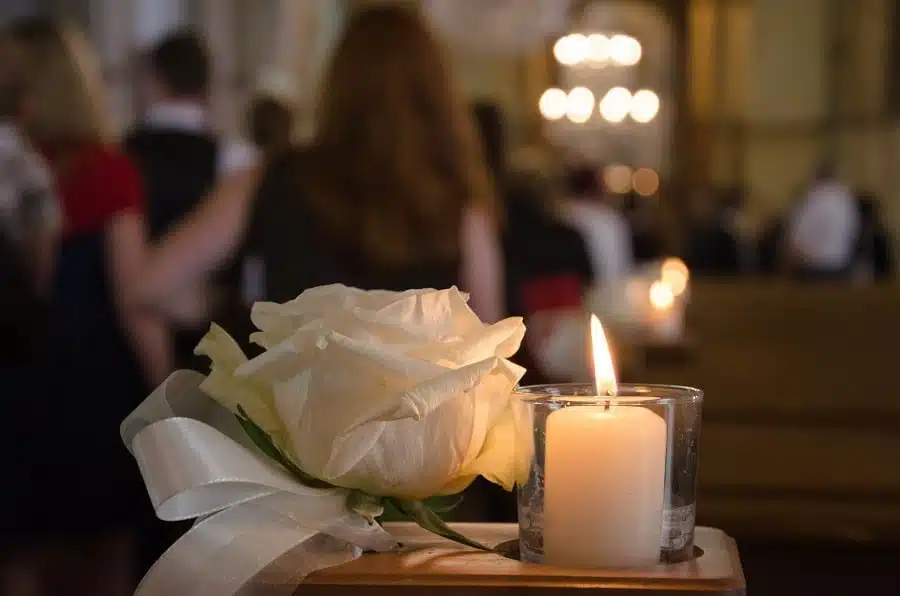Here’s the difference between elegy and eulogy:
Elegies are poems or songs and eulogies are prose.
Elegies are written in mourning for someone who has recently died.
Eulogies are written or spoken tributes that praise the memory of someone who has recently passed away.
If you want to know all about the differences between elegy and eulogy, then this article is for you.
Let’s get started!

What Are the Differences Between an Elegy and a Eulogy?

| Elegy | Eulogy | |
| Definition | A poem of lamentation often for the death of a loved one or other mournful subjects | A speech that’s typically part of a funeral service to offer praise or commendation to the deceased |
| How it’s expressed | A poem or verse expressing melancholy or sorrow for a loss of something or someone | Expressed by offering praises for the achievements or good character of someone who has died |
| Scope | It can be any form of work that contemplates a subject in a melancholic or reflective mood | A piece of written work or a speech that praises a person who has just passed |
| Nature/Specificity | Melancholic, sorrowful, and deep expression of sadness | A positive expression of praise and commendation |
At first glance, one might mistake “Elegy” and “Eulogy” for two different spellings of the same word.
After all, the English language is notorious for throwing every spelling at the wall and keeping whatever sticks.
This time, however, we are actually talking about two different literary forms.
They have some striking similarities, but it would be disingenuous to call them the same.
The main thing they share in common is that both deal with loss. Both forms aspire to capture feelings unique to the grieving process.
But from that singular focus, they differ more wildly than you might expect.
Why Is an Elegy a Poem and a Eulogy a Prose?

The first and perhaps most significant difference is the form.
An elegy is a poem, while a eulogy is typically a prose piece, usually a speech. This sounds self-explanatory, but it has profound implications that echo throughout both concepts.
Because an elegy is a poem, it is, by nature, usually expected to be much shorter than a eulogy would typically be.
A eulogy may contain the abbreviated story of a person’s last few years on earth, while an elegy may only describe a moment or a vague feeling. This is just a natural consequence of trying to capture grief.
The fewer words you have to work with, the more abstract the description will naturally get.
It doesn’t stop there, though. As a poem, elegies will typically take more liberties with grief than a eulogy would.
An elegy has more implicit freedom to explore the emotional space and stretch within it, reaching for images and thoughts that might be deemed too trite or random for a eulogy. This adds a touch of personality and ownership to elegies.
Eulogies, by contrast, are often very formal and stiff prose.
They’re intended to reach the utmost levels of acceptability and to deeply express the thoughts of those left behind, usually in a more general sense, whereas elegies are often personal to the writer specifically.

A eulogy might start thusly:
Honesty, joy, pride. These are only a few of the many things that Grandfather brought to our lives each day. Some of you knew him longer than I was alive, while others may be esteemed guests of a relative even younger than I. But I would argue that to each person, however, brief their time with him may have been, surely he tried to improve it. That’s just who he was, after all. A kind, caring man in a hard-as-nails world, just trying to make people laugh.
Note the formal tone, optimistic outlook, and attention to the audience. These are all marks of a traditional eulogy, though it may naturally differ depending on the writer’s mental state, family connection, and experience level.
After all, you couldn’t reasonably expect the family’s preacher to write the same eulogy that their spouse or child would write. It simply wouldn’t be a realistic expectation to have of them.
How Do an Elegy and a Eulogy Differ in the Occasion?

Eulogies are most commonly written to be read at a deceased person’s funeral as a speech that pays tribute to the deceased.
This results in several of the key features of a eulogy:
- The feelings are usually still fresh in the mind of the writer.
- The tone needs to be sober and acceptable enough to present as a speech, often in front of young children and the elderly.
- The target audience frequently consists of the funeral-goers, specifically, meaning the listeners know the subject personally.
- Part of the purpose is to celebrate the life of the deceased and assist survivors with emotional closure.
- The eulogy, or parts of it, maybe addressed to the deceased.

Meanwhile, an elegy is not at all constrained by timeframe or occasion.
The key feature of an elegy is that a loss inspires it, but it can otherwise be anything the writer brings to the form.
An elegy might be concrete or abstract, respectful or resentful, grim or humorous, etc.
Some elegies are written months or even years after the passing of the individual.
Elegies can’t be as neatly defined or constrained as eulogies because they never became a ritualized feature of a ceremony.
There are many tense, unspoken rules in writing a eulogy.
There’s pressure to have the speech be as close to what the deceased would have wanted as possible.
An elegy, by stark contrast, is basically free to the whims of the writer.
What Is the Difference Between an Elegy and Eulogy Based on the Target Audience?

While it was touched on briefly above, this really deserves its own dedicated section.
The target audience for a eulogy is ultimately the combination of the deceased and those who attend the funeral, in the vast majority of cases: them and only them.
This means that the scope of “known facts” is widely different.
Suppose the closest relatives were fully aware of some particular nickname or family secrets. In that case, they’re fair game to include without any explanation or context, within reason, because they’re things all attendees are expected to know.
Additionally, the tone only needs to appeal to the needs of that person’s inner circle.
A family that traditionally sees a funeral as a celebration of life will expect a drastically different eulogy than a family who sees a funeral as a grim reminder of death.

The person writing the eulogy will generally be expected to be intimately familiar with the needs of the mourners present.
Meanwhile, an elegy is written for the living, often to strangers and sometimes to no one in particular.
As with the previous statements about elegy, this is liberating in many ways, but there are some restrictions as well.
An audience who doesn’t intimately know the subject of the poem may not understand references to specific points in their life story.
It’s up to the poet to decide whether to explain any details or not, and much can be left to the imagination.
The rules of an elegy, or lack thereof, are defined by the poet. The rules of the eulogy rely on an unspoken code of ethics passed down through generations of a family.
